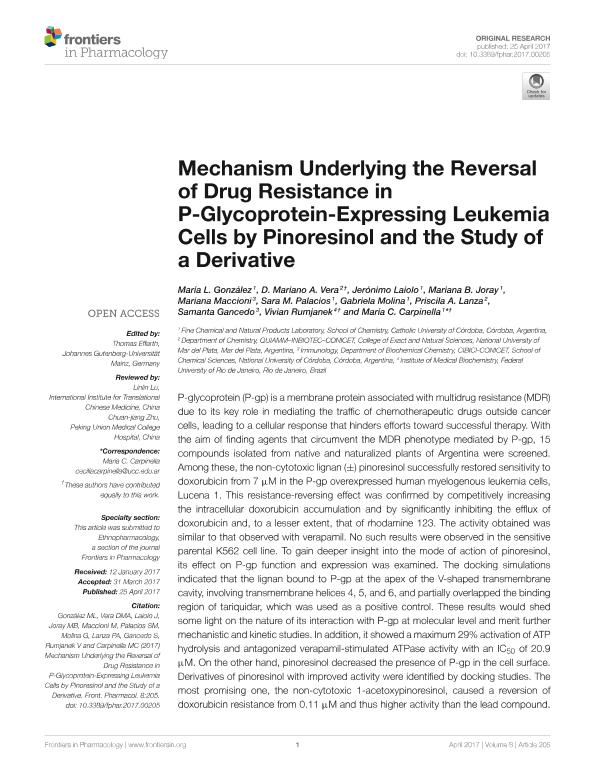Mostrar el registro sencillo del ítem
dc.contributor.author
González, María Laura

dc.contributor.author
Vera, Domingo Mariano Adolfo

dc.contributor.author
Laiolo, Jerónimo

dc.contributor.author
Joray, Mariana Belén

dc.contributor.author
Maccioni, Mariana

dc.contributor.author
Palacios, Sara Maria

dc.contributor.author
Molina, Gabriela
dc.contributor.author
Lanza Castronuovo, Priscila Ailin

dc.contributor.author
Gancedo, Samanta
dc.contributor.author
Rumjanek, Vivian
dc.contributor.author
Carpinella, Maria Cecilia

dc.date.available
2017-11-30T22:08:06Z
dc.date.issued
2017-04
dc.identifier.citation
González, María Laura; Vera, Domingo Mariano Adolfo; Laiolo, Jerónimo; Joray, Mariana Belén; Maccioni, Mariana; et al.; Mechanism Underlying the Reversal of Drug Resistance in P-Glycoprotein-Expressing Leukemia Cells by Pinoresinol and the Study of a Derivative; Frontiers; Frontiers in Pharmacology; 8; 4-2017; 1-19; 205
dc.identifier.uri
http://hdl.handle.net/11336/29412
dc.description.abstract
P-glycoprotein (P-gp) is a membrane protein associated with multidrug resistance (MDR) due to its key role in mediating the traffic of chemotherapeutic drugs outside cancer cells, leading to a cellular response that hinders efforts toward successful therapy. With the aim of finding agents that circumvent the MDR phenotype mediated by P-gp, 15 compounds isolated from native and naturalized plants of Argentina were screened. Among these, the non-cytotoxic lignan (±) pinoresinol successfully restored sensitivity to doxorubicin from 7 μM in the P-gp overexpressed human myelogenous leukemia cells, Lucena 1. This resistance-reversing effect was confirmed by competitively increasing the intracellular doxorubicin accumulation and by significantly inhibiting the efflux of doxorubicin and, to a lesser extent, that of rhodamine 123. The activity obtained was similar to that observed with verapamil. No such results were observed in the sensitive parental K562 cell line. To gain deeper insight into the mode of action of pinoresinol, its effect on P-gp function and expression was examined. The docking simulations indicated that the lignan bound to P-gp at the apex of the V-shaped transmembrane cavity, involving transmembrane helices 4, 5, and 6, and partially overlapped the binding region of tariquidar, which was used as a positive control. These results would shed some light on the nature of its interaction with P-gp at molecular level and merit further mechanistic and kinetic studies. In addition, it showed a maximum 29% activation of ATP hydrolysis and antagonized verapamil-stimulated ATPase activity with an IC50 of 20.9 μM. On the other hand, pinoresinol decreased the presence of P-gp in the cell surface. Derivatives of pinoresinol with improved activity were identified by docking studies. The most promising one, the non-cytotoxic 1-acetoxypinoresinol, caused a reversion of doxorubicin resistance from 0.11 μM and thus higher activity than the lead compound. It also caused a significant increase in doxorubicin accumulation. Results were similar to those observed with verapamil. The results obtained positioned these compounds as potential candidates for effective agents to overcome P-gp-mediated MDR, leading to better outcomes for leukemia chemotherapy.
dc.format
application/pdf
dc.language.iso
eng
dc.publisher
Frontiers

dc.rights
info:eu-repo/semantics/openAccess
dc.rights.uri
https://creativecommons.org/licenses/by-nc-sa/2.5/ar/
dc.subject
(±) Pinoresinol
dc.subject
1-Acetoxy-(+)-Pinoresinol
dc.subject
Multidrug Resistance Reversal
dc.subject
P-Glycoprotein
dc.subject
Plant-Derived Compounds
dc.subject.classification
Bioquímica y Biología Molecular

dc.subject.classification
Medicina Básica

dc.subject.classification
CIENCIAS MÉDICAS Y DE LA SALUD

dc.title
Mechanism Underlying the Reversal of Drug Resistance in P-Glycoprotein-Expressing Leukemia Cells by Pinoresinol and the Study of a Derivative
dc.type
info:eu-repo/semantics/article
dc.type
info:ar-repo/semantics/artículo
dc.type
info:eu-repo/semantics/publishedVersion
dc.date.updated
2017-10-11T15:09:59Z
dc.identifier.eissn
1663-9812
dc.journal.volume
8
dc.journal.pagination
1-19; 205
dc.journal.pais
Suiza

dc.description.fil
Fil: González, María Laura. Universidad Católica de Córdoba; Argentina
dc.description.fil
Fil: Vera, Domingo Mariano Adolfo. Consejo Nacional de Investigaciones Científicas y Técnicas. Centro Científico Tecnológico Conicet - Mar del Plata. Instituto de Investigaciones en Biodiversidad y Biotecnología; Argentina
dc.description.fil
Fil: Laiolo, Jerónimo. Universidad Católica de Córdoba; Argentina. Consejo Nacional de Investigaciones Científicas y Técnicas; Argentina
dc.description.fil
Fil: Joray, Mariana Belén. Universidad Católica de Córdoba; Argentina. Consejo Nacional de Investigaciones Científicas y Técnicas; Argentina
dc.description.fil
Fil: Maccioni, Mariana. Consejo Nacional de Investigaciones Científicas y Técnicas. Centro Científico Tecnológico Córdoba. Centro de Investigaciones en Bioquímica Clínica e Inmunología; Argentina
dc.description.fil
Fil: Palacios, Sara Maria. Universidad Católica de Córdoba; Argentina. Consejo Nacional de Investigaciones Científicas y Técnicas; Argentina
dc.description.fil
Fil: Molina, Gabriela. Universidad Católica de Córdoba; Argentina
dc.description.fil
Fil: Lanza Castronuovo, Priscila Ailin. Consejo Nacional de Investigaciones Científicas y Técnicas. Centro Científico Tecnológico Conicet - Mar del Plata. Instituto de Investigaciones en Biodiversidad y Biotecnología; Argentina
dc.description.fil
Fil: Gancedo, Samanta. Consejo Nacional de Investigaciones Científicas y Técnicas. Centro Científico Tecnológico Córdoba. Centro de Investigaciones en Bioquímica Clínica e Inmunología; Argentina
dc.description.fil
Fil: Rumjanek, Vivian. Universidade Federal do Rio de Janeiro; Brasil
dc.description.fil
Fil: Carpinella, Maria Cecilia. Universidad Católica de Córdoba; Argentina. Consejo Nacional de Investigaciones Científicas y Técnicas; Argentina
dc.journal.title
Frontiers in Pharmacology
dc.relation.alternativeid
info:eu-repo/semantics/altIdentifier/doi/http://dx.doi.org/10.3389/fphar.2017.00205
dc.relation.alternativeid
info:eu-repo/semantics/altIdentifier/url/https://www.frontiersin.org/articles/10.3389/fphar.2017.00205/full
Archivos asociados
